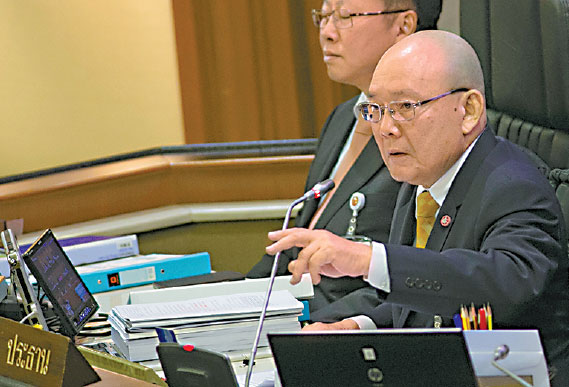Reform council rejects draft charter
The National Reform Council on Sunday rejected a draft constitution crafted to help move Thailand past almost a decade of political conflicts, forcing a rewrite over the next six months.
Members of the council, by a vote of 135 to 105, turned down the 124-page document, one of the longest in the world prepared by a constitution drafting committee.
It was met with strong opposition on almost all sides of the political divide in the Southeast Asian country, mostly for being undemocratic.
|
Thienchai Kiranan, president of Thailand's legislature, speaks before the body voted against the new draft constitution on Sunday in Bangkok. Wason Wanichakorn / AP |
The aborted charter would have led to the creation of a Strategic Council for National Reform and Reconciliation with absolute authority and independence from the executive, legislative and judicial branches; the possible naming of a nonelected prime minister by a postelection parliament; and the naming of nonelected senators by an ad hoc government committee.
Many members of the NRC, which is now dissolved, expressed strong disagreement with the draft charter, claiming it would have sown conflict among various sectors of Thai society.
So did the country's major political parties, namely the Democrat Party headed by ex-premier Abhisit Vejjajiva, and the Pheu Thai Party once headed by deposed premier Yingluck Shinawatra.
"The principles of democratic rule had been largely compromised and distorted by such a draft charter. It would unnecessarily leave problematic clauses which would by no means warrant the people's powers which should be invariably maintained as basis for democratic rule," said Direk Thuengfang, one of those reform councilors who voted against it.
He said the new constitution drafting committee will likely amend provisions pertaining to the naming of a nonelected head of government and senators as well as the creation of the strategic council.
A new constitution drafting committee will be set up within a month and the 21-person panel will be given 180 days to do the job.
The next draft charter will undergo a nationwide public referendum for approval within 30 days after it has been finished. The timetable means elections are unlikely before April 2017.
In the meantime, the interim government under Premier Prayut Chan-o-cha, who rose to power in a May, 2014 coup, will continue to run the country until the next election.
Xinhua - AP
(China Daily 09/07/2015 page12)















